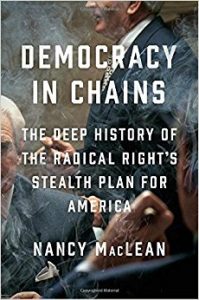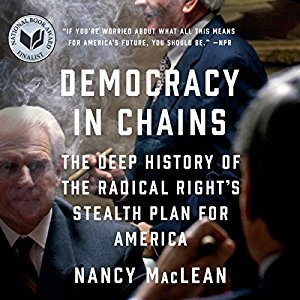Stealth and deliberate deception.
By Lynn Parramore
Institute For Economic Thinking (5/30/18)
Ask people to name the key minds that have shaped America’s burst of radical right-wing attacks on working conditions, consumer rights and public services, and they will typically mention figures like free market-champion Milton Friedman, libertarian guru Ayn Rand, and laissez-faire economists Friedrich Hayek and Ludwig von Mises.
James McGill Buchanan is a name you will rarely hear unless you’ve taken several classes in economics. And if the Tennessee-born Nobel laureate were alive today, it would suit him just fine that most well-informed journalists, liberal politicians, and even many economics students have little understanding of his work.
The reason? Duke historian Nancy MacLean contends that his philosophy is so stark that even young libertarian acolytes are only introduced to it after they have accepted the relatively sunny perspective of Ayn Rand. (Yes, you read that correctly). If Americans really knew what Buchanan thought and promoted, and how destructively his vision is manifesting under their noses, it would dawn on them how close the country is to a transformation most would not even want to imagine, much less accept.
That is a dangerous blind spot, MacLean argues in a meticulously researched book, Democracy in Chains, a finalist for the National Book Award in Nonfiction. While Americans grapple with Donald Trump’s chaotic presidency, we may be missing the key to changes that are taking place far beyond the level of mere politics. Once these changes are locked into place, there may be no going back.

Suppressing voting, changing legislative processes so that a normal majority could no longer prevail, sowing public distrust of government institutions— all these were tactics toward the goal. But the Holy Grail was the Constitution: alter it and you could increase and secure the power of the wealthy in a way that no politician could ever challenge.
An Unlocked Door in Virginia
MacLean’s book reads like an intellectual detective story. In 2010, she moved to North Carolina, where a Tea Party-dominated Republican Party got control of both houses of the state legislature and began pushing through a radical program to suppress voter rights, decimate public services, and slash taxes on the wealthy that shocked a state long a beacon of southern moderation. Up to this point, the figure of James Buchanan flickered in her peripheral vision, but as she began to study his work closely, the events in North Carolina and also Wisconsin, where Governor Scott Walker was leading assaults on collective bargaining rights, shifted her focus.
Could it be that this relatively obscure economist’s distinctive thought was being put forcefully into action in real time?
MacLean could not gain access to Buchanan’s papers to test her hypothesis until after his death in January 2013. That year, just as the government was being shut down by Ted Cruz & Co., she traveled to George Mason University in Virginia, where the economist’s papers lay willy-nilly across the offices of a building now abandoned by the Koch-funded faculty to a new, fancier center in Arlington.
MacLean was stunned. The archive of the man who had sought to stay under the radar had been left totally unsorted and unguarded. The historian plunged in, and she read through boxes and drawers full of papers that included personal correspondence between Buchanan and billionaire industrialist Charles Koch. That’s when she had an amazing realization: here was the intellectual linchpin of a stealth revolution currently in progress.
A Theory of Property Supremacy Over People
Buchanan, a 1940 graduate of Middle Tennessee State University who later attended the University of Chicago for graduate study, started out as a conventional public finance economist. But he grew frustrated by the way in which economic theorists ignored the political process.
Buchanan began working on a description of power that started out as a critique of how institutions functioned in the relatively liberal 1950s and ‘60s, a time when economist John Maynard Keynes’s ideas about the need for government intervention in markets to protect people from flaws so clearly demonstrated in the Great Depression held sway. Buchanan, MacLean notes, was incensed at what he saw as a move toward socialism and deeply suspicious of any form of state action that channels resources to the public. Why should the increasingly powerful federal government be able to force the wealthy to pay for goods and programs that served ordinary citizens and the poor?
In thinking about how people make political decisions and choices, Buchanan concluded that you could only understand them as individuals seeking personal advantage. …

